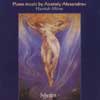Alexandrov Piano Music
A WORTHWHILE REVIVAL OF A FORGOTTEN LATEROMANTIC COMPOSER OF THE SOVIET ERA
View record and artist detailsRecord and Artist Details
Composer or Director: Anatoli Alexandrov
Genre:
Instrumental
Label: Hyperion
Magazine Review Date: 9/2002
Media Format: CD or Download
Media Runtime: 75
Mastering:
Stereo
DDD
Catalogue Number: CDA67328

Tracks:
| Composition | Artist Credit |
|---|---|
| (6) Preludes |
Anatoli Alexandrov, Composer
Anatoli Alexandrov, Composer Hamish Milne, Piano |
| Sonata for Piano No 4 |
Anatoli Alexandrov, Composer
Anatoli Alexandrov, Composer Hamish Milne, Piano |
| Obsession passée |
Anatoli Alexandrov, Composer
Anatoli Alexandrov, Composer Hamish Milne, Piano |
| (3) Studies |
Anatoli Alexandrov, Composer
Anatoli Alexandrov, Composer Hamish Milne, Piano |
| (10) Romantic Episodes, Movement: Adagio, cantabile |
Anatoli Alexandrov, Composer
Anatoli Alexandrov, Composer Hamish Milne, Piano |
| (10) Romantic Episodes, Movement: tempestoso e maestoso |
Anatoli Alexandrov, Composer
Anatoli Alexandrov, Composer Hamish Milne, Piano |
| Sonata for Piano No 3 |
Anatoli Alexandrov, Composer
Anatoli Alexandrov, Composer Hamish Milne, Piano |
| Visions |
Anatoli Alexandrov, Composer
Anatoli Alexandrov, Composer Hamish Milne, Piano |
| Elegy & Waltz |
Anatoli Alexandrov, Composer
Anatoli Alexandrov, Composer Hamish Milne, Piano |
Author:
This is rather a find. Even if you think you’ve heard of Alexandrov (or Aleksandrov)‚ you could well be thinking of Alexander Vasilyevich Alexandrov (18831946)‚ the founder of the Soviet Army Song and Dance Ensemble‚ rather than Anatoly Nikolayevich Alexandrov (18881982)‚ the longlived Moscow Conservatoire composition teacher. Anatoly Nikolayevich’s songs occasionally pop up in the recitals of expatriate Russians‚ but it is his keyboard works that were most highly regarded; there are as many as 14 piano sonatas‚ none widely known in the West.
In his creative work‚ Alexandrov sought to combine the divergent tendencies of his early teachers‚ Taneyev and Zhilyayev‚ the one respectful of tradition‚ the other seduced by the novel voluptuousness of Scriabin. This was the middle course also followed by Medtner and Myaskovsky and‚ if Alexandrov lacks their kind of individuality‚ his keyboard writing is never less than idiomatic and his refined sensibility brings its own rewards. In the late 1920s‚ with the ascendancy of the proletarian faction in Soviet culture‚ Alexandrov would seem to have had a hard time‚ but whether or not he welcomed the apparent stabilisation offered by the imposition of an official dogma of Socialist Realism after 1932 is unclear. Retreating to an elegant lateRomantic manner‚ he churned out much incidental and educational music before resuming stylistic experimentation in old age.
Given his track record in Medtner and Scriabin‚ Hamish Milne’s poetic insight comes as no surprise. He seems best attuned to the composer’s rapt selfcommuning side‚ marginally less happy with those items which might be thought to demand a more flamboyant‚ rhetorical approach. Sample track 17 if you can: the sixth of 10 Romantic Episodes Op 88 (1962)‚ dedicated to Alexandrov’s late wife. The invention is close to Rachmaninov or early Scriabin‚ yet‚ in Milne’s hands‚ it comes off beautifully as something more than pastiche. Track 18‚ the more active‚ 10th item in that set‚ seems shallower‚ though it is not easy to say whether this is the fault of the music‚ the playing‚ the instrument or the sound. (It might of course have something to do with the prejudices of the reviewer.) London’s Henry Wood Hall can be a difficult venue‚ but Jeremy Hayes and Tony Faulkner have come up with a generally agreeable effect without too much muddling hall resonance. The influence of Prokofiev is also occasionally apparent; the collection ends after all with a pensive‚ balletic waltz. Christoph Flamm’s detailed notes are very helpful too‚ so long as you can forgive his excessive enthusiasm for the two late pieces from Visions (1979 – tracks 22 and 23): these are well worth exploring‚ while remaining (to these ears) fundamentally reliant on the ‘visionary power’ of past models.
How to sum up? This is civilised‚ rewarding listening‚ warmly recommended to anyone for whom aesthetic novelty matters less than purely musical value‚ and for whom proof of political engagement is neither here nor there.
Discover the world's largest classical music catalogue with Presto Music.

Gramophone Digital Club
- Digital Edition
- Digital Archive
- Reviews Database
- Full website access
From £8.75 / month
Subscribe
Gramophone Full Club
- Print Edition
- Digital Edition
- Digital Archive
- Reviews Database
- Full website access
From £11.00 / month
Subscribe
If you are a library, university or other organisation that would be interested in an institutional subscription to Gramophone please click here for further information.




